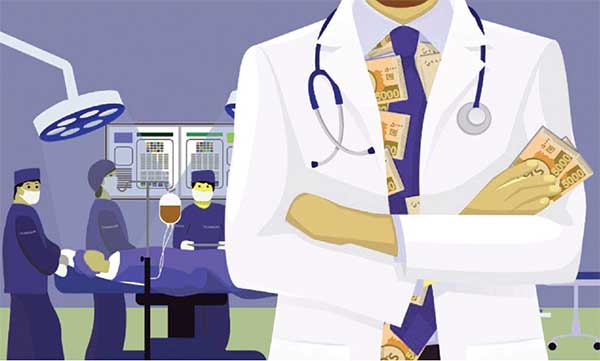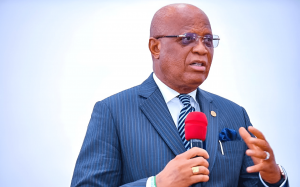Sri Lanka’s medical crisis is so bad one surgeon operated by the glow of cellphones

Outside the small room where he lives with his parents, an economic disaster is gripping Sri Lanka, prompting protests, food scarcity and electricity cuts — and leaving the medicine Miru needs in desperately short supply. Miru has a malignant brain tumor that causes him to have frequent epileptic seizures and fall unconscious for minutes on end. The only thing that helps is an anti-convulsant drug, but with Sri Lanka’s financial crisis hitting medical imports, Miru’s father, Upul Chandana, has struggled to find the medicine anywhere. “This is not available in the hospital anymore. Even nearby pharmacies have run out of stock,” said Chandana, as his only son plays on the thin mattress behind him. “Now, even with money, we can’t find the medicine.”span{color:#C5C5C5;}
]]>
Miru plays with his toys as a crisis unfolds around him. Credit: Upendra Herath/ CNN
Sri Lanka is battling its worst economic crisis in decades, as high foreign debt repayments and a massive trade deficit leave the country unable to import basic goods and medicine. Sri Lankans struggle to buy essential items such as milk powder and cooking gas, and Now, with medical drugs and equipment running low, the country is facing what’s being described by Singapore’s Red Cross as an “unprecedented humanitarian crisis.” Doctors report washing and reusing medical equipment — and even performing a surgery by the light of mobile phones. So far authorities have not confirmed any deaths from the medicine shortages — but experts warn the toll from the crisis could surpass the country’s more than 16,000 Covid deaths. “This is a crisis, we can’t predict how bad it’s going to get,” said Athula Amarasena, the secretary of the State Pharmaceutical Association in Sri Lanka that represents pharmacies across the country. “But we are aware we are heading into a further crisis.”span{color:#C5C5C5;}
]]>
Miru’s parents worry about getting him the medicine he needs. Credit: Upendra Herath/ CNN
A dire situation in hospitalsEach day, Wasantha Seneviratne traipses from pharmacy to pharmacy in Sri Lanka’s capital Colombo, desperate to find Topotecan, the chemotherapy drug his 7-year-old daughter needs to stay alive.At both the hospital where his daughter was admitted on April 7, and at each pharmacy he visits, it’s the same answer: The medicine isn’t available anywhere in the country. “No government hospital, pharmacy or importer has it. It is nowhere in Sri Lanka,” he said of the drug his daughter needs to treat neuroblastoma, a form of cancer. “What should I do? My child may not live long if she doesn’t not receive the medication.” Just a few weeks ago, Topotecan was offered free of charge by hospitals, but patients’ families are now tasked with sourcing it themselves from private pharmacies, Seneviratne said.Even that feels impossible. And the problem is much bigger than Seneviratne.According to a letter released by the Sri Lanka Medical Association (SLMA), all hospitals across the country lack access to emergency drugs and medical equipment. Several government hospitals have been ordered to suspend routine surgeries and reduce laboratory tests due to limited supplies of anesthetics and reagents used for tests, the SLMA says. And medical equipment, too, is in short supply. The president of the Perinatal Society of Sri Lanka, for instance, has ordered hospitals to sterilize and reuse endotracheal tubes used to deliver oxygen to newborn babies’ lungs as the tube shortage becomes “extremely critical,” according to a letter sent to the Ministry of Health from the society earlier this month and provided to CNN. span{color:#C5C5C5;}
]]>
Sri Lanka’s hospitals are short of supplies. Credit: Upendra Herath/ CNN
An intensive care surgeon who asked not to be named for fear of losing her job said vital medicine used to treat strokes and heart attacks is now in critically short supply and her hospital is being forced to reuse catheters. “I know I am endangering the next patient’s life. I feel hopeless and utterly helpless,” she told CNN this week, adding that she now spends much of her time disinfecting equipment to be reused. “This goes against everything we have been taught to do.” Although hospitals have mostly been spared electricity outages, the doctor told CNN they experienced a power cut while she and others performed surgery on a toddler for a heart condition. They were forced to continue operating using the torches on their mobile phones held by other medical workers until the generators powered up. “Despite having at least two mobile phones being held up, it is not easy to perform procedures or sutures in such light,” she said.For Seneviratne, there is little he can do to help his daughter. The economic crisis has left him without a steady job, meaning there is no way he can import the drugs from overseas. “There are many more (parents) who are also in deep sadness because they can’t find this medication, even if they have (enough money) in their hands,” he said. “We are holding in a lot of pain and sorrow. We don’t have the money to take our daughter overseas for medical treatment.”Back in the tiny room in Colombo, Miru’s father, Chandana, has similar fears. The family left their paddy farm and moved to Colombo so Miru could be treated. When he bought his last bottle of medicine, the pharmacist who sold it to him said it was his final bottle in stock. But now he only has a few days left of medication. His only hope is to keep searching for a way to find more.







